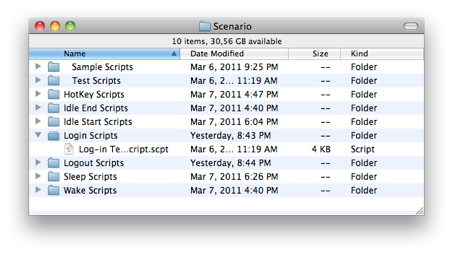
Simple Instructions
Scenario allows you to run AppleScripts when certain events happen. Here are a few instructions to get you started. Because Scenario is tied to AppleScript, you will need some detailed programming information for some scripts to work properly. You will find most of the required information here.
For advanced help, read the Scenario Programming Guide or contact us.
Scenario allows you to run AppleScripts when certain events happen. Here are a few instructions to get you started. Because Scenario is tied to AppleScript, you will need some detailed programming information for some scripts to work properly. You will find most of the required information here.
For advanced help, read the Scenario Programming Guide or contact us.

Interface
Scenario is controlled through a menu item you will find at the top of your screen, next to some of the other built-in items from Mac OS X. This is where you control it’s settings and Quit.
Scenario is controlled through a menu item you will find at the top of your screen, next to some of the other built-in items from Mac OS X. This is where you control it’s settings and Quit.


Settings
Controlling Scenario is quite simple. You can turn it On or Off and select which events trigger specific scripts.
Turning Scenario On or Off
When turned On, Scenario adds itself to your login items. Turning it off removes it.
Most of the triggers are self-explanatory.
Log-out scripts
Because of the way applications get notified by Mac OS X when they are asked to Quit when the user logs-out, Scenario must make its icon visible if you select to run scripts at that moment.
Important
Writing AppleScripts for use with Scenario required some special care in some cases. We strongly recommend you consult the Scenario Programming Guide before undertaking your programming endeavours.
Controlling Scenario is quite simple. You can turn it On or Off and select which events trigger specific scripts.
Turning Scenario On or Off
When turned On, Scenario adds itself to your login items. Turning it off removes it.
Most of the triggers are self-explanatory.
Log-out scripts
Because of the way applications get notified by Mac OS X when they are asked to Quit when the user logs-out, Scenario must make its icon visible if you select to run scripts at that moment.
Important
Writing AppleScripts for use with Scenario required some special care in some cases. We strongly recommend you consult the Scenario Programming Guide before undertaking your programming endeavours.


Options
Show Icon in Menu Bar
You can opt not to show the icon in the Top Menu Bar. If you select not to, you will need to launch Scenario from the Applications folder to change its settings.
Show Icon in Menu Bar
You can opt not to show the icon in the Top Menu Bar. If you select not to, you will need to launch Scenario from the Applications folder to change its settings.

The Script Folder
Open Script Folder
Scenario creates a folder in your personal Library which contains a subfolder for each type of action. Simply drop any AppleScript in the appropriate folder and it will run if that type of action is turned on in Scenario.
Scripts have to be simple AppleScript documents with the extension «scpt» to be recognized.
This is also where you can find scripts to test if everything is running properly, as well as some Sample Scripts to get you acquiainted with some of the special techniques required to work well with Scenario.
Open Script Folder
Scenario creates a folder in your personal Library which contains a subfolder for each type of action. Simply drop any AppleScript in the appropriate folder and it will run if that type of action is turned on in Scenario.
Scripts have to be simple AppleScript documents with the extension «scpt» to be recognized.
This is also where you can find scripts to test if everything is running properly, as well as some Sample Scripts to get you acquiainted with some of the special techniques required to work well with Scenario.

